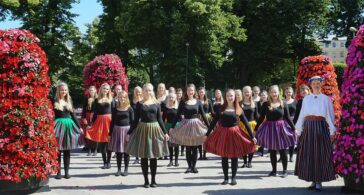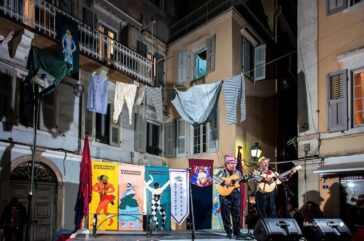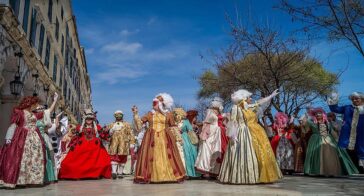Last updated on July 5th, 2025 at 02:56 pm
The Language in Medieval Corfu
The historical route of Corfu has influenced the way of life and the culture of the island’s inhabitants.
The language could not, therefore, be an exception. The linguistic idiom that was influenced and shaped during Venetian domination is what we now call the Corfiot dialect.

Corfiot Dialect
Until about 1500 CE, the population of the island was mixed. We had the Greek descendants of the ancient Corinthians who constituted about 60% of the population. On the other side, the Venetian nobles lived mainly in the city of Corfu.
Because of these conditions on the island, a mixed language called ‘Veneto’ was spoken. It was a mix of Greek and Italian as the Venetians spoke. Slightly different than the Italians of southern Italy.
Later and shortly after 1500 CE, a large wave of immigration began with Greek refugees from the Peloponnese, Crete, and Cyprus, who still spoke a language close to ancient Greek.
Immigration took place at the time when these areas fell into the hands of the Ottomans and Corfu was still under Venetian domination.
This resulted in a dramatic change in the constitution of the population in favor of the Greek element. This caused the reduction of the Latin population that was limited to certain parts of the city.
Also because of this event, the Orthodox Christian faith was permanently overwhelmed.
That put an end to the efforts to convert to Catholicism been attempted from time to time by many conquerors, especially by the Andegavs when they had the island under their sovereignty, around 1300 CE
The Catholics of course existed and still exist in significant numbers in Corfu. They constitute the second doctrine of the population.
But the Corfiot linguistic idiom evolved following the Greek grammar and syntactic while incorporating too many Italian words. Since of course the Greeks first added Greek endings to these words!
This process gave rise to the Corfiot dialect, a variant of the Greek language incorporating Italian-Greek words while adhering to Greek grammar and syntax.
It is essential to emphasize that this dialect shows absolutely zero influence from English or French whatsoever.
Let’s not forget also the special accent of the Corfiot dialect. A much more singing-like, that is the result of its comradeship with the Italians.
Until the beginning of the 20th century, the use of Italian words was so extensive. The locals could talk with each other without being understood by the rest of the Greeks.
But this has changed over the years.
Now the Italian words used at that time, after the death of the older, are almost forgotten. They are not used anymore but constitute a museum part of the linguistic evolution on the island.
Before being forgotten, however, many managed to pass through the rest of Greece and integrate into our language. This is obvious by studying these words and their origin.
This is a phenomenon that happens in all living languages of the world. As the English language has 30% of the words having Greek roots, also in the Greek language, we have words of Italian, Slavic, and Turkish origin.
Of course, the Corfiot linguistic idiom is part of our historical culture and a sign of the Corfiot identity.
Efforts should be made not to be forgotten by recording and keeping these words in books that we would call museums of language or using them in various events that happen on the island.
And this is what happens in the well-known Petegoletsa. They are theatrical performances of the road and are played during Halloween. The Petegoletsa contains dialogs full of these words.
These performances help maintain the tradition. The inhabitants of Corfu, of course, do not use these words anymore. Although they know them very well.
Most of these words now sound very funny and make people laugh, we invoke them when we want to laugh at something.
So, if you ever find yourself in Corfu and get to watch either the Petegoletsa or some other theatrical show do not even think that this is the language spoken in Corfu today!.
Below we will try to present a large list of these words and expressions along with their meaning.
We want to record the words used by our ancestors for historical reasons. Also due to our respect for tradition.
We can not deny that we have fun while listening to them, they are really beautiful and original words, remnants of a medieval Greek-Italian lingual salad.
The list includes just a few characteristic Corfiot words with Italian origin and roots from about 5.000 words of this kind in total, but for an English-speaking person, it makes no sense to add them here…
However, if you wish to get an idea keep reading.
In the first column are the words, and next to them is, let’s say, the translation in English. Believe us, it’s not easy to translate correctly those words as the meanings refer to a different era.
Corfu dialect dictionary
Words starting with Alpha
Akola = very deep, bottomless
Antzoula = type of metal clothing button
Asta = get up
Aste ntoue = imposed on me
Averta panga = continuation
Averto = open space
Avatserno = I have to receive
Abentoros = haggler
Avizaro = warn
Avogadoros = prosecutor
Avogatos = Lawyer
Agantsaro = grab
Agarlizo = I’m stirring
Aggelokrouome = I’m scare
Agerina = fine sand
Agiouto = help
Aggonari = corner in a wall
Akistaro = I make something mine
Akleriazo = I destroy
Akouzaro = I Blame
Aleggros = cheerful, happy
Alabratsante = embrace
Alaskaventza = With the jacket draped over the shoulder
Alafostia = The scarlet fever (disease)
Alegatsiones = explanations
Alimangou = at last
Alipopordies = kind of mushroom
Alipotsakalis = crossbreeding of a fox with a jackal
Alitzerinos = Algerian pirate
Alterados = not feeling well
Alipotanao = to discipline
Aloises = bad women
Amantzalos = poorly dressed
Amente = attention
Amaskaloviza = woman with big boobs
Amidonika = yes
Amiti = oh how
Amolados = unleashed (usually a lunatic or a bad dog)
Amolerno = I unlease the dog
Ampantonados = bum
Ampitichi = if it happens
Ampla outarita = absolute authority
Amponora = early
Amonte = let’s go
Anantelos = wayward
Anantaflos = careless or the man prone to accidental damages
Anagkemenos = ill
Anapapsolia, Here, a special explanation is needed; these are hanging bracelets from the ceiling or bed canopy, on which women placed their feet to avoid fatigue during sexual activity. They were also given as part of the dowry to the bride until the 19th century. Well, What did you think?
Anaraida = Nereid
Anaritsia = creepiness
Anafoufou = uncertain
Anemokapsou = disappear
Anesistagos = Anxious or the naughty child
Apasvesta = the lime plaster
Apidi = Pear
Apithono = I put down something
Apelante = the appeal to a court
Apertoura = opportunity
Apiompo = ready
Apodelipa = the rest of
Apothosou = sit down
Apokontriasmenos = besotted
Apoliora = short time ago
Aposimpelo = almost
Arekia = roughly placed
Aresto = the jail
Aravantoula = the hare
Arivaro = I come I arrive
Asistagos = messy
Atzardo = daring
Afidevome = I dare to trust
Afoufou = Distraction
Acharoloisti = mindless, ungainly
Apelo = I throw something away
Apsono or Apsiono = tuft
Words starting with Beta (pronounce as ‘V’ in Greek)
Verde = green
Vavilato = the color of the goldfly
Vagapontis = swindler
Valerozos = deserving
Veramente = at last
Vatema = making sex, it refers to domestic animals
Vaccina = Vaccine
Vatsounia = bramble
Veramente = true
Vesta = robe
Viatzo = trip
Viziganti = poultice
Virtsinos = in debt
Vourdoulio = disgrace or shame
Vourlismenos = crazy
Vordonas = big pimple
Words starting with Gamma
Ganies = coal stains
Gardeli = goldfinch
Garmouni = anthrax disease
Garboza = the chick
Gdono = stretch
Generalis = General
Giornada = the daily wage mainly of women in the fields
Godebelos = Cheerful
Godero = I enjoy
Words starting with Delta
Dekiarao = declare
Dekreto = decision
Delegkou = fast, quick
Delegatos = mandated
Dempitoros = debtor
Denontsia = medical opinion
Depoutatos = authorized
Derotoros = director
Desgouto = dissatisfaction
Desmporso = Expences
Despoutatos or Ntespoutatos = ruler
Destemeli = zone
Destinaro or Ntestinaro = direct
Diagkilos = Devil
Diana = white
Diargyros = mercury
Diaskatze = who cares
Diaskatzos = Devil
Diasonas = large infected pimple
Dotoros or Ntotoros = Doctor
Words starting with Epsilon
Entesa = I messed up somewhere
Eto = this is it
Edourise = it bear the hardships
Etharapaika = I enjoyed
Eloou mou = me my self
Ermokounarito = tramp
Eriastika = I got very cold
Eroumposa = I filled my mouth greedily
Esporso = paying
Efetibamente = really
Ebale posta = he targeted me
Words starting with Zeta
Zegkounas = kind of wild vegetables
Ziazo = weigh
Zifo = squiz
Zaroneyris = cramp
Zmparlados = aunbalanced
Zmpoukio = crash
Words starting with Eta
Words starting with Theta
Tharapaika = I enjoyed
Thermoutsa = hot coals
Words starting with Yiota
Imitaro = mimic
Impanto or mpanto = he left me alone
Impeniaro = I guarantee
Impetsiles = fool
Impetsilita = fooliness
Impostoros = crook
Impoutaro = I’m defiling someone
Inamorados = fall in love
Inbentario = census
Inbestiro = invest
Inkanto = auction
Inkouizitos = accused
Inkomoda = annoyances
Inmpanto = abandoned
Inpenio = obligation
Inpoumpliko = in public
Insoma = at last
Intemela or Ntemela = pillow case
Interesados = lobbyist
Interios = entire
Intimados = satisfied
Intimatzion = notification
Intonados = properly accented musically
Ipotekado = mortgaged
Isbetzes = in its place
Isestero = insist
Isponero = I am interested
Words starting with Kapa
Kazo = fact
Kazo mplanko = grand fact
Kazo pensato = premeditated action
Kazo atsintente = accident
Kaltsa mpraga = men’s socks of nobility
Kamara nta ritsebere = hall vestibule
Kamara nti tsibile = Mansion living room
Kantaros = earthenware, basin
Kanto = song
Kapo nte fiori = cauliflower
Kapos = cheef
Karlakas = frog
Kastike (mou) = I thought
Kentroma = grafting onto trees
Kikara = cup
Kabalos = jacks and decks because these cards have knights (kavalarrides = horsemen)
Kabaloutsi = carrying someone on the back
Kabatzaro = i go pass someone
Kadinatso = iron dragster
Kakontramados = bad dressed man
Kalopezoulos = honest
Kalohairetis = polite
Kamalimagkou = at last
Kamiziola = short women’s traditional jacket
Kampoula = smoke or fog
Kanaleto = gutter, gutter for rainwater
Kantsoneta = popular song
Kantouni = narrow street
Kantsilieris = secretary
Kaouriko = very hot pepper
Kapitolo prompatori = strong evidence
Kapatsaro = tame
Kapolaboro = artifice
Kapouralos = the boss
Karataro = count
Karatelo = large barel
Kapotsino = small carriage
Kartelo = small barel
Kartezi = 1/8 of a galon
Kartoutso = 1/4 of a liter
Kasadoura = the door frame
Kastelanos = castle owner
Katsibelo = inferior, insignificant
Kenono = serving
Ki ‘anteso = and now what?
Klaniola = fart tool
Klitsinari = long branch
Koitasi = fall in sleep
Kogionaro = make fun of
Kokariki = the pit of the olive
Kolarina = tie
Koletantes = dressed with tie
Koliantza = diarrhea
Koloentses = affections
Kolompimpiri = sup with just pasta
Kolorados = colored
Kolpiro or Korpiro = get very tired
Komintoro i pomintoro = tomato
Kompebelos = reactionary
Konsaro = foist
Kontrampado = smuggling
Kontraposta = controversial position
Konfermados = confirmed
Kourtelatsa = stone quay
Kouarelaro = stair with the eyes
Kougiampalo = old fart
Koukounaki = sitting on the knees
Kouraro = I care
Kornoutos = cuckold
Koutelitis = bad wine that makes your head bad
Koutseli = small dog
Koutsoheristika or koutsoheriastika = my hands got tired
Kouhtio = old crippled man
Kratimara = paralysis of the hands
Kroubentziana = Hide and seek, children’s game
Kryogatsoulo = someone who feels very cold
Konkses = stubbornness
Kotolo = traditional dress for old women
Mores kai katsides = curse
Ntale kouale = the same
Ohia kai monomerida = answer to an unpleasant refusal
Tarantela Kariera = posting boat
Fora Kolompa = he took it all in stride
Words starting with Lamda
Lahtisa = i felt pain
Likasma = infection, mainly in the mouth
Linto = diluted, weak
Litsino = made from wood of olive tree
Labadouros = sink
Labamas = sink
Labomanos = sink
Laboro = work
Laggeyei = his eye is flying
Lamasa = pdefiant or large unruly woman
Lapante = clean
Laourentis = master’s assistant, mainly in construction
Larono = Calming down
Lementados = complaining
Letrina = toilet
Lefti psomi = loaf
Leyterida = bat
Ligathinos = weak, getting ill easy
Ligkio = hiccup
Likazo = I get just a little taste, I don’t have time to eat it..
Likasionas = slug
Limpa = the balls
Lionteritsino = castor oil
Liosta = olive mill waste
Lougretsio = very old woman
Louta = I got completely wet
Words starting with Mi
Mantoles = almonds with sugar
Mantzaro = I eat
Moustakas = cricket
Miligkas = meninges
Mazeni = tool for grinding coffee
Makarontsini = short and small macaroni
Malathraki = disease of skin and spirit, has a lump on the head (malakia)
Mantekouto = stroke
Margomenos = numb
Markantiko = grosery shop
Mastelo = vessels for washing clothes
Matsola = wooden hammer
Meliggitis = miniggitis
Mi siftakeis = to fail to reach
Miatzimias = at once
Minaro = masturbate
Mintzibiris = skimpy
Morofinto = middle wall
Morseto = wooden vise
Morozos = lover
Moskiera = hanging cage mainly for bread
Mosteritsa i bosteritsa = small lizard
Mouzeto = mask
Mourdoulis = prone to get dirty
Mouzariola = dog muzzle
Mpatelo = small wooden boat
Mparos = rock with vegetation in the sea
Mpiga = crane
Mpagordantes = he knows to eat well
Mpaltsamados = embalmed
Mpaniomaria = way of cooking eggs
Mparoufantes = trouble maker
Mparoufa = trouble
Mpastakounados = standing
Mpartsoleta = funny speak
Mpataro = upset
Mpatelo = wooden boat
Mpatselados = crazy
Mpertouela = hinge
Mpikerini = small glass
Mpirmpitsiola = children’s team game
Mpitsikleta = motorcycle
Mpokoleta = earring
Mponagratsia = curtain rod
Mposketo = garden
Mpotsoni = glass jug
Mpoukaleto = jug
Mpoukalina = bottle
Mpoukoubala = bread in olive oil
Mpouleti = lottery ticket
Mpoumpoulas = big black insect
Mpoursa = hidden pocket for money
Mpriskoula = a game with cards
Mprokado = extra pay for good work
Mpontzos or Mpotzos = small balcony
Momolos = monkey
Mosteras = large lizard
Pounta malinia = pneymonia
Words starting with Ni
Nekriasmeno = sleeping like dead
Nerokonida = chilblain
Neromploutsi = foof without taste
Netaro = I finish with something
Neyrida = neuralgia
Nibelo = alfadi
Niokatsente = everything ok
Niorantes = exhibitionist
Nodaros = notary
Noumpoulo = A Corfu cured meat
Nteno = I stack
Ntemela = pillow case
Ntzia or Tzia = Ant
Ntrimono = I hide secretly
Ntrita linia = straight line
Ntoltse = kind of oranges
Ntontolos = one who has one ball only
Noberos = he who is silly
Nona = grand mother
Nontsolos = neocorus
Ntefetados = one who has health problems
Words starting with Ksi
Ksekenti = at the end
Ksempourizo = kick out
Ksepyrise = the nose bleeds
Ksinitas = sour wine
Ksompliazo = gossip, I say bad words
Words starting with Omicron
Ontsolos = candlelighter
Orse = Corfu muja, orse, (there is not a specific translation)
Okoupados = busy
Ompia = obsession
Ompligados = obliged
Onore = honnor
Opstante = welcome
Oritsikas = the base of tail
Ordino = decree
Words starting with Pi
Peka = caprice
Pelisa = I throw something useless
Petsiko = tanned
Pila = large barel for olive oil
Pinta = pewter cup with handle
Pirola = fola, poison in the food for small animals used decades ago.
Pagkouli = small stool
Palaiouthe = since the old times
Pangkoui = paying hand by hand
Paniolo = the deck floor in a small ship
Papalina = small sardine
Parabento = protection from strong wind
Paramonas = hunter ambush point
Partsinebelos = the boss
Parontzolo = sucker
Pasapronto = spaghetti strainer
Patatona = the sweet potato
Paylosyka = the prickly pears
Pekados = capricious
Pensatos = thoughtful
Piperoni = pepper
Pergoulia = grapevine
Perouaro = I am resting
Pertsipitados = stubborn
Peskada = fishing
Pitiki = bitter
Pitsikoli = small child
Piatsa = square
Piatsebelos i piazebelos = plentyful
Piniata = copper cauldron
Pitsikamortis = grave Digger
Pitsouni = pigeon
Pitoros = painter
Podologos = cloth that women put on their heads to carry things
Pomintoro = tomato
Pontelo = support
Pontigio or pontilio = stubbornness
Pontidos = spiky
Portoni = garden’s gate
Postitsio = tentatively placed
Poutsarona = too much dirt
Poumpliko inkato = auction
Prebantorio = orphanage
Prebedouros = foresight (commissioner during Venetian rule)
Pretsipitada = lively or sprightly
Probato = I walk
Pryobolos = old kind of lighter with a wick
Poberos = poor
Pontes = small wooden pier
Words starting with Ro
Ramolimento = old man with softening of the brain
Raporto = report
Reberentzes = hgreetings
Regalo = tip
Rekousiniaro = compromise
Remegkou = fluttering
Rementzo = oars
Rementio = therapy
Rempartaro = upset
Rempoukaro = plaster
Rentikolo = ridiculous
Rentikoletsa = ridiculous
Respetados = respectful
Retseta = note
Rompabila = useless things
Rompabekias = worthless
Roumpoma = filling with food
Routsoula = washer
Roufoulas = typhoon
Words starting with Sigma
Sagiadoros = door handle
Salado = salami
Salamistrado = salty
Saltsada = cobbled street
Sampieros = John Dory
Sartsada = garden
Sgorna = watercourse
Sestados = neat
Siora = lady
Sior = sir
Skanio = chair
Skarda = clove
Skabentzo = remnant
Skalinada = stone road staircase
Skarmoutso = roll of coins
Skartsouni = sock
Skatzia = shelf
Skafoni = wooden press for grapes
Skepeto = gun for hunding
Skertsados = mad
Skiaomai = I scare
Skletza = wood spike
Skotitas = scotodin, poultry disease
Skoutzikas = large lizard
Sonaro i Souonaro = play music and sing
Sospeto = suspection
Soulatso = walk
Soukeras = big fig
Soumpito = soon
Speoulo = embankment
Spabento = surprise, agitation
Spalabieri = special trowel
Spatsaro = I sell out and leave
Sperna = evening hut, but made only in a special day in October.
Spetseriko = special spice mix for Patsitsada
Spetsieris = pharmacist
Stia = the fireplace
Stoua = suffocating atmosphere
Straisto = a kind of bag
Stretos = narrow
Stringka = thin board
Strampalados = peculiar person
Stronizo = I change side in sleeping
Sfalaggi = small kind of spider
Words starting with Taf
Tamparo = heavy jacket
Tankoui = pouch
Tablatso = square board
Taylokounia = moves a lot, here and there, not steady
Taylomastela = washing board in mastelo
Teleri = glass frame
Terefos = defective
Tetartia = he broke in pieces
Tetartiastika = I broke in pieces
Tzitziras = cicada
Tzaleti = cornmeal fritters
Tzardini = small garden
Tzogatoulo = something that gets broken easy
Tzitzifionkos = conceited
Tzournada = women’s daily wage
Tzoukariera i tsoukariera = sugar bowl
Tzousto = exactly
Tzobeno = an old man pretending the young
Tzogia = Joy
Tortsonia = big candles
Tritsa = psathin chapel
Trabentzo = transfusion
Trampouko = corruption
Trataro = I buy drinks
Tratamento = drinks for everyone
Triko = sweater
Tritseli = tripod
Trohalos = wall with plain stones
Tsantos = Aleksandros
Tseroula = kind of small fish that ressembles sardine
Tseta = gang
Tsima pila = on the edge
Tsito = chasing a cat away
Tsapela = dried figs strung on a rope
Tsantsamini = Jasmine
Tserbelo = mind
Tsigkri = teasing person
Tsiritzantzoules = tricks with words
Tsitsimpyra = Gingerbeer
Tsoutsa = chutcha
Tsokolo = skirting board
Totso = too litle
Words starting with Ypsilon
Words starting with Phi
Faborebole = favorable
Falimento = bankruptcy
Famozos = famous
Fanestra = window
Filania = central beam in roofs
Filistoka = large document
Fiorados = adorned with flowers
Fleronas = yellow bird eating figs
Fogatsa = Easter bun
Foumada = excitement
Fourentes = passionate
Freskamento = refreshment
Frokali = broom
Fortikas = Donkey
Words starting with Chi
Htikitas = tuberculous
More about Corfu
Festivals and Panigiria in the Villages of Corfu
Experience authentic Corfiot culture at traditional village festivals (panigiria) with local food, music, and heartfelt celebrations year-round.
Gossip with a Twist: Corfu’s Petegoletsa Tradition
On the last Thursday of the carnival, Corfu has revived a very old tradition, an integral part of the Corfu carnival, which dates from the years of Venetian rule. It is called the Petegoletsa.
Corfu Carnival: Echoes of a Venetian Past
The Ancient celebrations in early spring that took place in honor of Dionysus, god of wine and fun, hoping for a good harvest and successful husbandry, are the forerunners of today’s carnival in Greece.
What is Corfu best known for?
Beyond its natural beauty, what is Corfu famous for? as a melting pot of various civilizations, is famous for its architecture, traditions, and cuisine.
Corfu Musical Tradition – Literature and Intellectuals
Corfu’s rich cultural heritage features a strong musical and literary traditions that continue to shape the island’s cultural identity until today.
Melodic Corfu: A Symphony of Culture, Music, and Beauty
Corfu, the musical heart of Greece, where the very air seems to harmonize with the soulful sounds of music when musical charm doesn’t stop at instruments and performances only.











2 Responses
A Cockle
English-speakers can be interested as well!!! Please let us have a lexicon of these words with their translations…
Teo
Ok, I’ll add the words as soon as possible